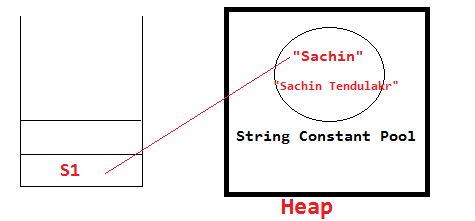2.String Class
There are two ways to create String object:
1.By string literal
String s1="Welcome";
String s2="Welcome";//It doesn't create a new instance
2.By new keyword
String s1=new String("Welcome");//creates two objects and one reference variable
Understand the following cases
Case 1 : literal VS Object
public class StringDemo {
public static void main(String[] args) {
String s1 = "Cat";
String s2 = "Cat";
String s3 = new String("Cat");
System.out.println(s1 == s2); // true
System.out.println(s1 == s3); // false
}
}
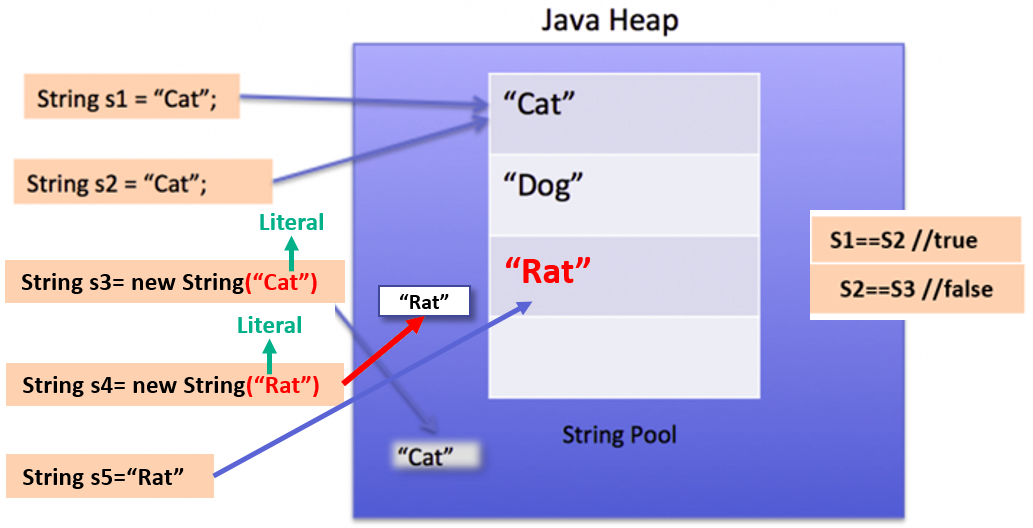
-
first line of code is literal type, so first it will search in SCP, String ’Cat’ is existed or not. here ‘cat’ not exist on the String pool so, -Cat” will create in SCP& it will reference to s1.
-
second line of code is literal type, so first it will search in SCP, String ’Cat’ is existed or not. here ‘cat’ already exist on the String pool so s2 reference to existed “Cat”.
-
Third line of code is Object type, but it has literal ’Cat’ ,so first it will serach -Cat” in SCP, it is alredy present, so it wont create literal in SCP, then it will create String Object with given string no matter if Object with same String literal already exist or not.
-
Fourth line of code is Object type, but it has literal ’Rat’ ,so first it will serach -Rat” in SCP, it is not present, so it will create literal in SCP, then it will create String Object with given string.
-
Fifth line of code is literal type, so first it will search in SCP, String ’Cat’ is existed or not. here ‘cat’ already exist on the SCP, but it doest have any references. so s5 reference to existed “Rat”.
Case 2:
String s1 = "abc";
String s2 = s1;
s1 += "d";
System.out.println(s1 + ", " + s2 + ", " + (s1 == s2));
--------------------------------------
abcd, abc, false
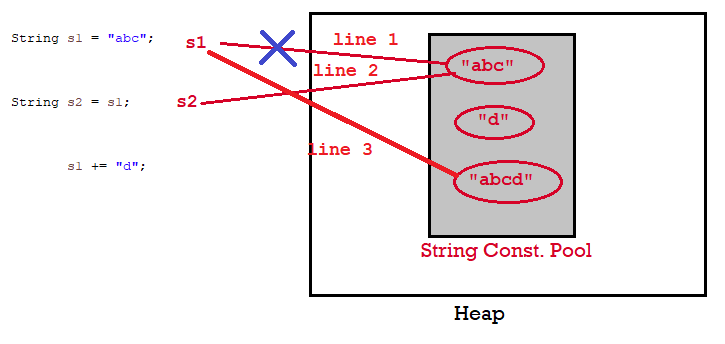
Case 3:
StringBuffer s1 = new StringBuffer("abc");
StringBuffer s2 = s1;
s1.append("d");
System.out.println(s1+", "+s2+", "+(s1==s2));
---------------------------------
abcd, abcd, true
StringBuffer operates on Same Object .
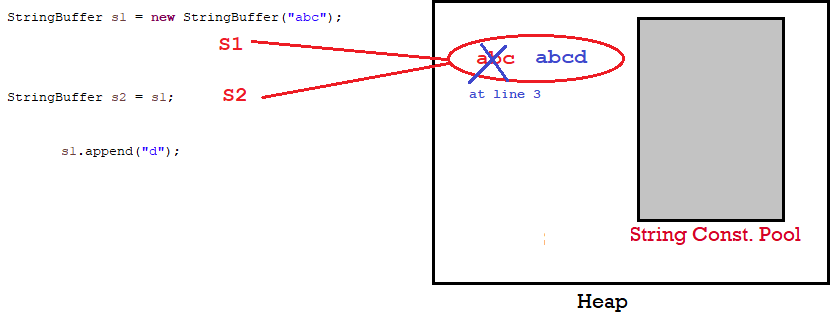
Whenever we created String of Object type, first it will store in SCP & then String of Object type will be created.
Case 4:
String a = "hello" + " world";
String b = "hello world";
System.out.println(a==b); //TRUE
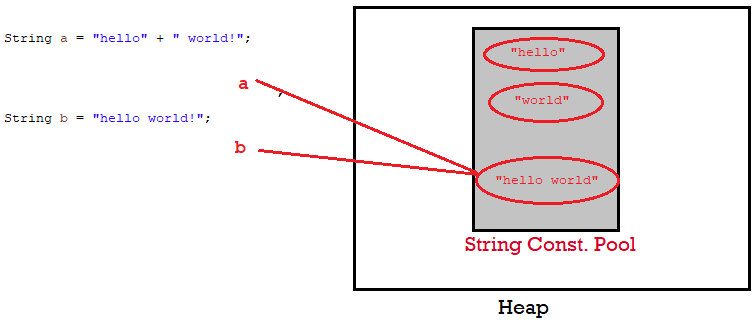
When concatenating two string literals "a" + "b" the jvm joins the two values
and then check the string pool, then it realizes the value already exists in the
pool so it just simply assigns this reference to the String.
Case 5 : (+= uses StringBuilder Inside to Create & Append String)
String a = "Bye";
a += " bye!";
String b = "Bye bye!";
System.out.println(a == b);//FALSE
This case is kind of different tho, because you’re using the += operator which when compiled to bytecode it uses StringBuilder to concatenate the strings, so this creates a new instance of StringBuilder Object thus pointing to a different reference. (string pool vs Object)
Oracle Says, to improve performance, instead of using string concatenation, use StringBuffer.append(). String objects are immutable
Performance
It’s better to use StringBuilder (it’s an unsynchronized version; when do you build strings in parallel?) these days, in almost every case, but here’s what happens:
When you use + with two strings, it compiles code like this:
String third = first + second;
To something like this
StringBuilder builder = new StringBuilder( first );
builder.append( second );
third = builder.toString();
for example, you might be using many different appending statements, or a loop like this:
for( String str : strings ) {
out += str;
}
In this case, a new StringBuilder instance, and a new String (the new value
of out – Strings are immutable) is required in each iteration. This is very
wasteful. Replacing this with a single StringBuilder means you can just produce
a single String and not fill up the heap with Strings you don’t care about
To get the String which is created in SCP while executing String(-welcome”), we
use intern() method
String s=new String("Welcome");
String s2=s.intern();
System.out.println(s2);// Welcome
In java, string objects are immutable. Immutable simply means unmodifiable or unchangeable.
class Testimmutablestring{
public static void main(String args[]){
String s1="Sachin";
s1.concat(" Tendulkar");//concat() method appends the string at the end
System.out.println(s1);//Sachin, because strings are immutable objects
}
}
